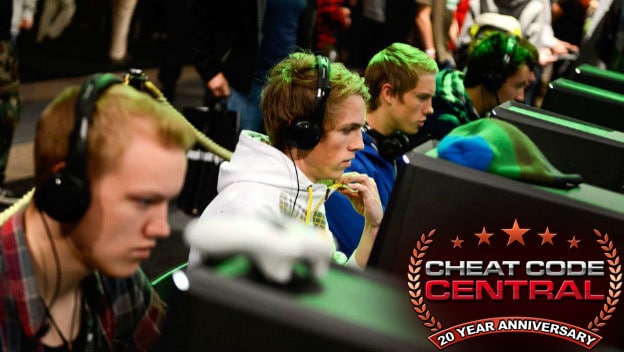You’d think being a grown up would entail refraining from looking up game FAQs and Let’s Plays until you beat the game in question, but nope. The rest of the Cheat Code Central staff and I have always cheated, and we will continue to do so so long as we’re capable of inputting commands into a controller. That’s fine, to an extent. It’s an unofficial requirement for writing for this site. But what is it that compels us to cheat? Are there ethical reasons for cheating? How have our habits changed since we first started playing video games?
When I was growing up, cheating was possible thanks to a series of codes that allowed you to have infinite lives or engorged the size of enemy heads, among many possibilities. Enter enough of these codes, and they become ingrained into your muscle memory. Just ask anybody who knows the famous Konami code. Speaking of which, some gamers would never have completed Contra had it not been for that code. I’d like to say that I would save the cheating for after I beat a game; however, it’s just not possible for a kid to get through an NES-hard game without bending the rules sometimes. Games are hell. You do what you must to survive.
Now, however, consoles and PCs are connected to the internet. Many of us either should have learned by now or gleefully disregard the rules, much to the chagrin of their teammates and opponents. Studios can combat cheating, but those players can also respond unreasonably, sometimes with death threats. It’s hard to stop people from cheating, and that’s a problem because they ruin everyone else’s fun just for kicks. And cheating is much more sophisticated compared to the era of cheat codes, what with aimbots, gold farming, and hacking, oh my!
I can’t defend such behavior; but I do think that in a single-player setting – or at least when playing with close friends – cheating is not only acceptable, it’s part of what makes the medium unique. For all the talk of wanting better storytelling in games, it’s a much different experience compared to movies and books. Sure, we can glance over certain passages or blink and miss a scene, but the writers and directors have total control over the story. If you’ve ever wandered around as Gordon Freeman while Alex and Eli Vance discuss important matters, then you know that player input alone can impact a story. Add cheating into the mix and you get beautiful chaos.

I think some gamers cheat because they like to push back against the developers, and that makes sense. Video games are sort of like friendly challenges from creators to consumers. In a single-player setting, no one is forcing us to play by the rules. It feels good to test the boundaries of a game, then share our new unorthodox strategies with the community. I certainly appreciate watching Let’s Plays that shows me easier ways to destroy a boss. I personally consider exploiting glitches as a mild form of cheating because it’s a loophole unintentionally designed by the creators themselves and I never would have beat Ninja Gaiden for the NES if it wasn’t such a glitchy mess.
I think developers have caught onto this. They know that gamers crave freedom and will use any in-game method to obtain it. We have sandbox games that are huge, impressive, technical marvels. However, even Skyrim feels incomplete without a mod where all the dragons look like Randy Savage. Gamers will even take things into their own hands and tweak the magic system to their liking or just add a shout that rains trains for the sheer lulz. Gamers can and will find exploits regardless of how tightly designed your product is, so screw it! Why not open your game up and let them have some fun?
Image Credit: Matt Leunig
